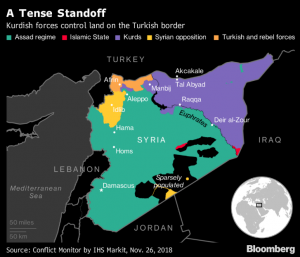As night falls in Akcakale, Turkish armored vehicles rumble into position behind walls of protective sandbags, diverting their guns from a town across the Syrian border controlled by U.S.-backed Kurdish fighters. The dust-churning maneuver ends another day of a tense truce between NATO’s second-largest army and a militia it considers a mortal enemy.
The adversaries are separated only by untended fields of cotton, barbed wire and tracks of the Berlin to Baghdad railway that was conceived more than a century ago to further imperial claims on territory.
Turkey says its military is confronting another attempt to redraw the region’s maps. It believes Syrian Kurds have been joined by their armed Turkish brethren to better pursue a long dreamed of Kurdish state that Ankara will not countenance. The standoff at the frontier could easily explode.
In his latest saber-rattling intervention, President Recep Tayyip Erdogan said on Tuesday that Turkey can’t stand by while it’s menaced by the Kurds. The “days when we will crush terrorists are very near,” he said. The president then chaired a five-hour meeting of the National Security Council.
Erdogan has sent troops into northern Syria to attack Kurdish positions before and is especially angered by a decision the U.S. says was intended to help keep the peace.
Last week, Defense Secretary James Mattis outlined plans to set up observation posts to warn Turkey of any dangers heading its way, perhaps redeploying some of the American troops who have been assisting the Kurdish YPG in the fight against Islamic State. Turkish leaders, however, see the plan as really designed to protect the Kurds by putting Americans in harm’s way of an attack by Turkey.
Erdogan has been ramping up his nationalist rhetoric ahead of municipal elections in March, but that doesn’t mean his threats are idle or that there’s little at stake.
U.S. officials have warned that extending Turkish military action east along the Syrian frontier would raise the chances of a direct confrontation with American troops. It would also damage international efforts to prevent a jihadist resurgence by drawing Kurds from a battle they fought for years to win, they say. Erdogan rejects those claims as propaganda.
The YPG, or People’s Protection Units, are affiliated with the Syrian Kurdish Democratic Union Party. Both deny they are enemies of Turkey and say they seek only to protect Syria’s Kurds. They have controlled swaths of northern Syria since 2012, when the government in Damascus withdrew troops to bolster its heartlands. The militia temporarily lost some key towns to Islamic State’s brutal advance before retaking them backed by U.S. air power.
Turkish Sights
Its sporadically hot border conflict with Turkey since then has made household names of a string of formerly obscure frontier towns. There’s Afrin, seized from the Kurds by Turkey in March, and Manbij, which Erdogan has repeatedly vowed to take. From Akcakale, it’s Tal Abyad that’s in Turkish sights.
Turkey has been preparing to capture the town using allied Syrian Arab forces, according to two people familiar with the planning who asked not to be named due to the sensitivity of the issue.
An offensive would likely open new rifts between Ankara and Washington only weeks after a crisis over a jailed American pastor was resolved. Mattis nodded to those better relations in the Nov. 21 Pentagon briefing where he outlined the observer mission.
Read more HERE
Ask me anything
Explore related questions





